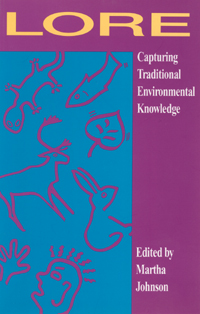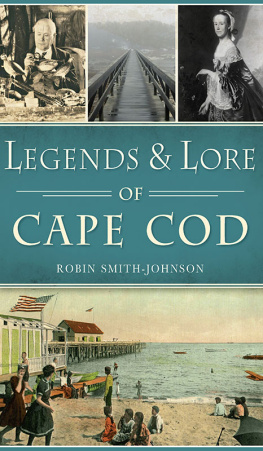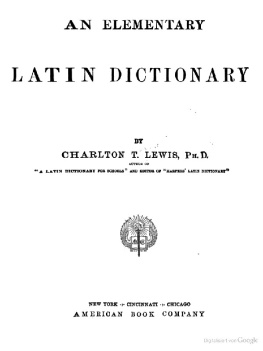Cover

| title | : | Lore : Capturing Traditional Environmental Knowledge |
| author | : | Johnson, Martha |
| publisher | : | International Development Research Centre |
| isbn10 | asin | : | 0889366446 |
| print isbn13 | : | 9780889366442 |
| ebook isbn13 | : | 9781552501078 |
| language | : | English |
| subject | Human ecology--Congresses, Environmental protection--Congresses, Conservation of natural resources--Congresses, Economic development--Congresses.--Environmental aspects , Hombre--Influencia sobre la naturaleza , Medio ambiente, Proteccin del , cologie-- |
| publication date | : | 1992 |
| lcc | : | GF50.L67 1992eb |
| ddc | : | 363.7 |
| subject | : | Human ecology--Congresses, Environmental protection--Congresses, Conservation of natural resources--Congresses, Economic development--Congresses.--Environmental aspects , Hombre--Influencia sobre la naturaleza , Medio ambiente, Proteccin del , cologie-- |
Page i
LORE
Capturing Traditional EnvironmentalKnowledge
Page ii

| Our culture is something that surrounds us,something that is part of us, and is inextricably linkedwith the land upon which we have lived for thousandsof years. Our culture has a past, and it is that past especially as we find it embodied in our elders thatwe are pledged to preserve. It also has a present a present that threatens our culture, which we arepledged to protect. Our culture lives, and must have afuture. We are pledged to promote our culture,especially among our young people, to ensure thatthey will identify themselves as Dene, in the fullmeaning of the term. The mission of the Dene CulturalInstitute is to work with the people of the DeneNation, and with other institutions and organizations,to preserve, protect, and promote the Dene culture,languages, spirituality, heritage, traditions, andcustoms. |

| The International Development Research Centre is apublic corporation created by the Parliament ofCanada in 1970 to support technical and policyresearch designed to adapt science and technology tothe needs of developing countries. The Centres fiveprogram sectors are Environment and Natural Resources, Social Sciences, Health Sciences, Information Sciences and Systems, and CorporateAffairs and Initiatives. The Centres funds areprovided by the Parliament of Canada; IDRCspolicies, however, are set by an international Board ofGovernors. The Centres headquarters are in Ottawa,Canada. Regional offices are located in Africa, Asia,Latin America, and the Middle East. |
Page iii
LORE
Capturing Traditional EnvironmentalKnowledge
Edited by
Martha Johnson
DENE CULTURAL INSTITUTE

INTERNATIONAL DEVELOPMENTRESEARCH CENTRE
Page iv
Copyright 1992 by the Dene Cultural Institute and the InternationalDevelopment Research Centre
Johnson, M.
Dene Cultural Institute, Hay River, NWT, CA
Lore: capturing traditional environmental knowledge. Ottawa, Ont.,IDRC, 1992. + 190 p.: ill.
/Ecology/, /environmental management/, /resources management/,/environmental education/, /indigenous population/, /traditional culture/,/folklore/, /social research/, /documentation/, /data collecting/, /informationexchange / /case studies/, /Canada/, /Oceania/, /Sahel/, /Thailand/,/conference reports/, bibliographies.
UDC: 574:303.2(=1-81) ISBN 0-88936-644-6
All rights reserved. No part of this publication may be reproduced, stored ina retrieval system, or transmitted, in any form or by any means, electronic,mechanical, photocopying, or otherwise, without the prior permission of theInternational Development Research Centre. The views expressed herein arethose of the authors and do not necessarily reflect the views of theInternational Development Research Centre or the Dene Cultural Institute.
Page v
Foreword
In recent years, the value of the traditional knowledge of indigenouspeoples, and particularly their traditional environmental knowledge,has been recognized. This has unleashed a flood of research. Some ofthe research has been undertaken by scientists working alone, butthe most innovative responses to this trend have been developed byindigenous researchers working in collaboration with Westernscientists. They recognized early on that the main objective was notsimply to collect reels of audio or video tape as a form of folklore,but to catalogue this information so that it could be compared fromone region and one culture to other regions and other cultures, and,even more, so that it could be brought to bear on policies forsustainable development in remote and typically fragile ecosystems.
This book presents the results of a workshop on the documentationand application of traditional environmental knowledge throughcommunity-based research. Organized and hosted by the DeneCultural Institute (DCI) based in Fort Hay, Northwest Territories,Canada, and supported by Canadas International DevelopmentResearch Centre (lDRC), the workshop brought together a smallnumber of teams, each composed of indigenous and nonindigenousresearchers from Northern Canada, Europe, Africa, Southeast Asia,the South Pacific, and South America. Their primary goal was todiscuss effective methods for documenting the unique
Page vi
environmental knowledge and understanding that characterizes theheritage of all indigenous peoples around the world.
In many ways, the workshop was unique. It represented animportant initiative on the part of a Canadian aboriginal organization (DCI) and a Canadian development agency (IDRC) workingtogether toward a common goal. The workshop was held in atraditional Dene camp along the shores of the Deh Cho (MackenzieRiver) in the Canadian North. Participants flew to Canada fromaround the globe. Upon arrival in Canada, they faced anotherextended flight to Yellowknife in the Northwest Territories. Fromthere, they were taken by bush plane and boat to the Dene camp.Daily life and workshop sessions took place in tents, which bothrepresented typical living conditions during actual collection ofindigenous knowledge and, unhappily but typically for the North,provided protection from the cold and rainy summer weather.
This book examines the process of collecting traditional environmental knowledge while using a participatory action orcommunity-based approach. It looks at the problems associatedwith documenting traditional knowledge problems that areshared by researchers around the world and it explores some ofthe means by which traditional knowledge can be integrated withWestern science to improve methods of natural resourcemanagement.
Next page













